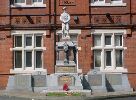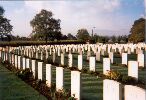
Newton-le-Willows and
Earlestown War Memorial

| OTHER WARS |
 |
Newton-le-Willows andEarlestown War Memorial |
 |
| The
Great War Roll of Honour |
|||||||||||||||||||||||||
Captain H. Whalley-Kelly, in his book “Ich Dien –
The Prince of Wales’s Volunteers”, gives the following account:
“The New Year opened auspiciously with the Turks pinned down at Kut and
fighting desperately to retain their positions on the right bank in the Dahra
Bend, and about the now famous Liquorice Factory; every day being more closely
encircled by the methodical but determined British advance until, by the middle
of February, the last survivors had surrendered, and Maude's victorious soldiers
were in readiness to force the river crossings and cut off those of the enemy
still remaining on the left bank.
"During January the Battalion had its full share of minor operations and
patrolling, and had 3 officers and 63 other ranks killed and wounded. In the
first week of February it was moved across the Hai into the Dahra Bend for more
serious work. The Turks were still holding out in this area and the big Anatolians
who composed the bulk of their regiments, natural fighters to a man, were a
tough proposition in the maze of trenches that confronted the attackers. On
9th February the Battalion bombers were lent to the 6th King's Own Regiment
and did splendid work in helping to capture a series of strong points under
Sergeants Prescott and O'Neil, both of whom were awarded well-deserved Military
Medals.
"On 10th, 11th and 12th February the Battalion was fighting continuously,
every day making further inroads into the Turkish defences which were now beginning
to crumble under the relentless pressure of the British attacks. The operations
at this period were of the trench-warfare type, although the enemy's positions
were not highly organized and attacking units frequently found their flanks
comparatively open. On fine days the sun was unpleasantly warm at times, and
the stench in the trenches almost unbearable, littered as they were with the
corpses of Turkish soldiers.
"By the 13th our advance had nearly reached the bank of the Tigris near
Shumran. On this day Captain C. R. Goldie-Taubman, commanding " C "
Company, saw an opportunity to exploit still further the success of the previous
day and at once seized it, leading his company in dashing style to the capture
of one of the few remaining Turkish strongholds in this area. He was quickly
supported by the other companies, and the fight continued until the morning
of the 14th, when consolidation was taken in hand.
"In the operations outlined above, the Battalion had taken in all 5,000
yards of hostile trenches, and had been continually in action for three days
and nights. For his fine work on the 13th Captain Goldie-Taubman was awarded
the Military Cross, and Sergeant J. Kennedy received a Military Medal for conspicuous
bravery. Unfortunately, however, Captain and Adjutant P. W. Ward, M.C., and
Captain G. R. Cattarns, M.C., were killed, and Captain H. B. St. John (1st Battalion)
and Second-Lieutenant W. A. Cheers were severely wounded, together with many
N.C.Os. and men. The two officers killed had been with the Battalion since the
early days of its existence; and their loss was felt keenly by all ranks.
"On the 15th the Dahra Bend was finally cleared of Turks and the Battalion
bivouacked on the river bank, without tents or other shelter, while one of the
periodical storms of rain and hail raged overhead. In the words of the War Diary:
"Everyone was wet but happy."
The original Battalion War Diary entry
can be found here, while another
account of the the fighting between December 1916 and March 1917 is here.
While a poem about life in Mesopotamia
can be found here.